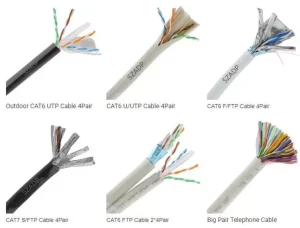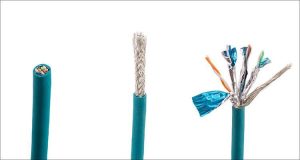As high-speed communications continue to evolve, Cat6a cable has become the most cost-effective and future-proof product. Not only is it backward compatible with Cat6 and Cat5e cables, but it also supports data rates up to 10 Gbps and a maximum bandwidth of 500 MHz.
If you are considering a new installation or upgrading your existing infrastructure and purchasing structured cabling, cat6a is your best choice. Not only is it the cable of choice today, but it is also the standard for future-proof cabling infrastructures.

Here are eight compelling reasons why ZMS Cable believes Cat6a is the cable of choice.
Optimize Network Speed and Coverage
More and more network resources are migrating to the edge, and the demand for data speed and capacity continues to grow. Cat5/6 cables are susceptible to channel damage in the operating environment.
Issues such as crosstalk, impedance mismatch, external noise, and echo loss can cause errors that reduce overall throughput.
Cat6a cables are designed to overcome these challenges, supporting speeds up to 10G and maximum lengths of 100 meters, nearly triple that of Cat6.
| Class | Bandwidths | 1GDistance | 10GDistance |
| Cat 5e | 100 MHz | 100m | _ |
| Cat 6 | 250 MHz | 100m | 37m |
| Cat 6A | 500 MHz | 100m | 100m |
| Cat 7 | 600 MHz | 100m | 100m |
| Cat 7A | 1000 MHz | 100m | 100m |
| Cat 8 | 2000 MHz | 100m | 100m |
Compliance with POE Power Standards for Device Requirements
The continued integration of enterprise networks is consolidating a wide range of network devices into a unified network infrastructure.
In the process, original equipment manufacturers (OEMs) are taking advantage of newer Power over Ethernet (PoE) standards.
These standards enable all four-pair cables to double power delivery for high-power applications, such as medical devices that require more power, and the updated PoE standards require higher-grade cables, making Cat6a ideal for these demanding network cabling solutions.
Cat6a Cable Standardization Support and Applications
General Indoor Cabling
In February 2008, ISO revised the global ISO/IEC 11801 standard to specify the use of cat6a cables/connectors for links/channels up to 500 MHz.
Power Over Ethernet
TIA’s TSB-184-A Balanced Twisted Pair Cabling for Power over Ethernet applications recommends the use of Category 6a cabling to better support IEEE 802.3bt four-pair PoE.

Wireless Access Points
TIA’s TSB-162-A Telecommunications Cabling Guide for Wireless Access Point Locations recommends using Cat6a for horizontal cabling of WAPs in new installations.
Medical Facilities
ANSI/TIA-1179-A Standard for Telecommunications Infrastructure in Healthcare Facilities recommends the use of Cat6a (for trunk and horizontal copper cabling) for new installations.
Support for Backward-Compatible RJ45 User Interfaces
Cat6a cables support a backward-compatible RJ45 user interface. RJ45 is a proven, familiar, and backward-compatible interface that demonstrates the power of standardization, driving the global growth of Ethernet as a common interface used in a wide variety of scenarios.
Cat6a Cable is Safe and Rugged
Cat6a cables are among the safest and most durable Ethernet cables available today.
The jacket is made of a new environmentally friendly material, PVC CM, which provides excellent durability, flame retardancy, and flexibility.
Specified test reports are available through Fluke patch cable testing, including NEXT, PS NEXT, ACR-F, PS ACR-F, ACR-N, PS ACR-N, and RL parameters.
This ensures that a stable, high-speed network connection can be provided, guaranteeing the accuracy and reliability of data transmission.
High-Quality Bare Copper Conductor
Cat6a cables utilize bare copper conductors to maintain their quality.
They are highly resistant to corrosion and can be used for long periods without wear and tear while providing optimal performance.
Another advantage of bare copper conductors is their flexibility and good ductility, making them ideal for use as cable conductors; they can be easily twisted without breaking.
In addition, bare copper conductors do not generate as much heat as other materials, which increases efficiency. When the conductor does not generate heat, the fire hazard is reduced or eliminated under optimum conditions.
Better Performance and Return on Investment
Cat6a offers ten times the performance and twice the capacity of Cat6 cables.
It represents a major leap forward, supporting 10 Gbps transmission (compared to 1 Gbps) and doubling the bandwidth from 250 MHz to 500 MHz.
While Cat6a cables may cost 10% to 20% more than Cat6 cables, they are future-proof network cables that, once installed, won’t need to be replaced for years. In the long run, you’ll get better performance and return on investment.
